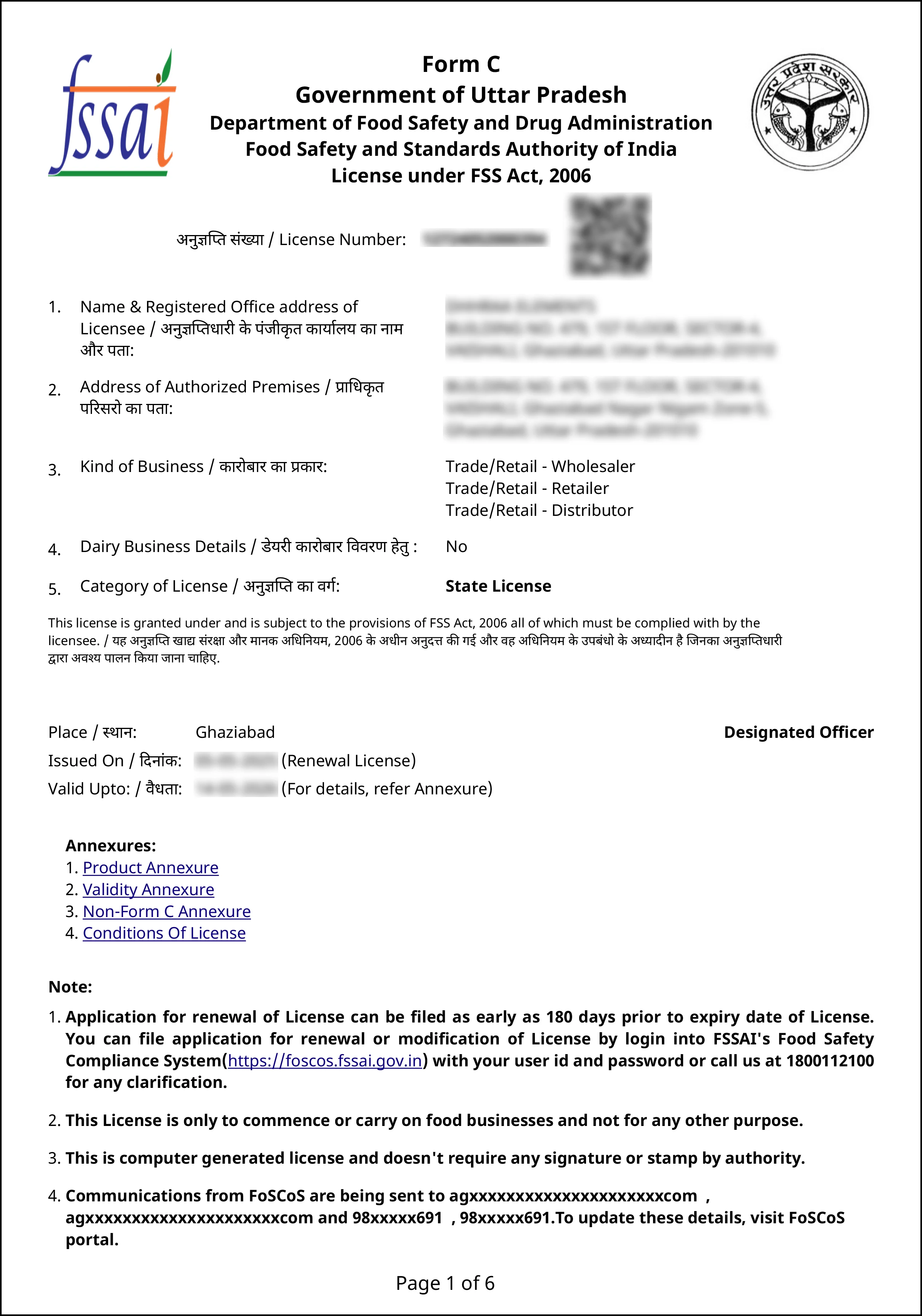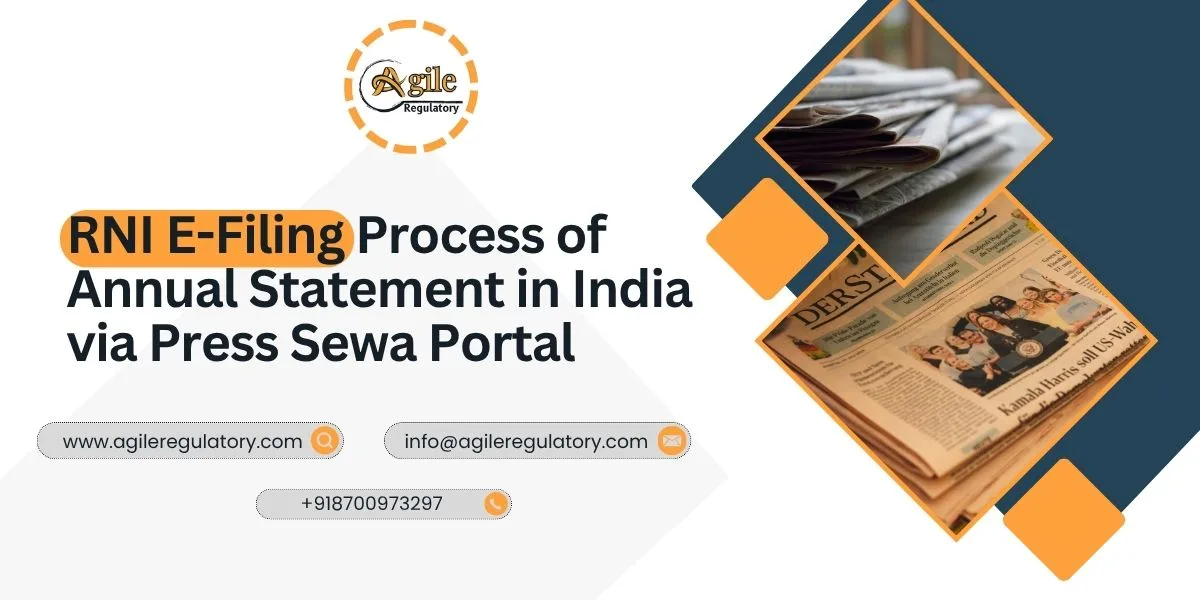

In India, the Food Safety and Standards Authority of India (FSSAI) is essential to maintaining the quality and safety of food items. The regulatory body has required companies operating in the food sector to secure the appropriate FSSAI license or registration in accordance with their qualifications and make sure it is renewed on time.
Through the renewal process, the Food Safety and Standards (Licensing and Registration of Food Businesses) Regulations 2011's requirements for business compliance are reviewed and updated by the FSSAI, ensuring that the FBO's operations remain compliant. It is essential that you renew your license on time to prevent fines, legal repercussions, and interruptions to your business.

There are three categories of FSSAI licenses: the Central FSSAI license, the State FSSAI license, and the Basic FSSAI license. Any application for renewal can be submitted after the deadline, but before the expiration date. A login ID and password are required in order to renew an FSSAI license. The three types of FSSAI licenses are mentioned below:
Also known as "FSSAI License Renewal Form A," this license renewal is available to all food industry operators who meet the basic registration requirements, which are defined as having a turnover of less than 12 lakhs. The cost of renewing your food registration varies from Rs 100 to Rs 500 based on the number of years you select.
This is also known as "FSSAI License Renewal Form B." This form is applicable to all food industry operators who meet the state licensing requirements and have a revenue between Rs 12 lakh and Rs 20 crore.
The Food Safety and Standards Authority of India, a reputable body within the Ministry of Health and Family Welfare, Government of India, grants the central FSSAI license. Food businesses that have annual revenue of more than Rs. 20 crore, operate in more than one state or have several locations within a single state are required to have it.
The Central FSSAI license is granted in accordance with the Food Safety and Standards (Licensing and Registration of Food Businesses) Regulations, 2011. It is important to submit an application to the FSSAI online portal with the required documentation and payments in order to obtain the license. Food importers and exporters, dairy and dairy product facilities, food producers, processors, packers, and repackers are just a few of the several food-related sectors it covers.
The following documents must be submitted in order to get a renewal of FSSAI basic registration:
In the event of a central license, a 100% EOU certificate from the Ministry of Commerce.
The process of FSSAI license renewal is mentioned below:
Step 1: In accordance with the Food Safety and Standards Act, Regulations, and Laws, the first and most important step in renewing an FSSAI license is to complete Form A (Basic FSSAI Registration Form) or Form B (Central or State FSSAI Registration Form), attach the previous license, and provide the necessary self-attested documentation.
Step 2: The completed application for an FSSAI license renewal is then submitted to the FSSAI online portal.
Step 3: The reviewing authorities of the Food Department will verify the documents thoroughly and will raise a query in case any clarification is required.
Step 4: The authorized FSSAI inspector will carry out a thorough inspection of the food business location, as well as a review of the policies and standards of the establishment.
Step 5: After application review and onsite inspection, the FSSAI authority will issue a renewed food license to the applicant.
| Type of Application | Central License (1 year.) | State License (1 year.) | Basic Registration (1 year.) |
|---|---|---|---|
| Fresh Application | 7500 | 2 to 5000 | 100 |
| Renewal | 7500 | 2 to 5000 | 100 |
| Modification | 7500 | 2 to 5000 | 100 |
| Duplicate | 10% of total fee | 10% of total fee | 10% of total fee |
The validiy of a renewed FSSAI license depends upon the duration choosen by the applicant and fee paid at the time of renewal. You may renew your fssai license for 1 to 5 years. An applicant shuld start the renewal process at least 30 days before its expiry date. If you failed to do so you can still paaly for the renewal by paying the late fee or penalty.
In case if you failed to renew the food license before expiration date, a late fee of Rs. 100 per day will be applicable after the end of expiry date. The late fee or penalty will be calculated on a daily basis. FSSAI may also takes an legal action or will shutdown your business permanently.
It is important to renew the FSSAI license before its expiration to continue your food operations in India. Moreover, you won’t be able to continue selling food, if you do not renew your FSSAI license on time.
If the food business operator fails to file the FSSAI renewal application within the allotted period, they will be subject to a fee or penalty of Rs. 100 per day. If an FBO's FSSAI license is not renewed within the allotted time, it is said to have expired. Therefore, obtaining a new license is essential for the owner of the food business. It is preferable and advised to renew the FSSAI license on time in order to prevent these needless fines and hassles. Before the previous FSSAI registration or license expires, every FBO must apply for a renewal of their FSSAI license within 30 days.
Your food business will be compliant with the regulatory criteria imposed by the Food Safety and Standards Authority of India if you have an FSSAI license. Having the FSSAI license increases customer confidence since it proves that your food items are safe and hygienic. For renewing the FSSAI food license, you can contact Agile Regulatory and renew your license on time.
Read more: A Complete process of FSSAI license
Read more: How to get a FSSAI license?
Read more: Documents required for FSSAI license

 Nishi Chawla
Nishi Chawla
07 Oct, 2025

 Nishi Chawla
Nishi Chawla
07 Oct, 2025

 Nishi Chawla
Nishi Chawla
30 Sep, 2025

 Nishi Chawla
Nishi Chawla
30 Sep, 2025

 Nishi Chawla
Nishi Chawla
26 Sep, 2025
We simplify compliance through a proven 4-step process: Consultation, Documentation, Submission, and certification. From understanding requirements to getting final approvals, we deliver a smooth, timely, and fully compliant journey for your business.
What our customer says about us
Fantastic support from the team. Their expertise transformed our approach, driving remarkable outcomes. A must-have partner for businesses seeking effective consulting solutions. Highly recommended.

KTPL Instruments
Agile Regualtory delivers exceptional solutions. Their insightful guidance streamlined our processes and boosted profitability. Highly recommended for businesses seeking expert consulting services to thrive.

Justrack IOT
Impressed by Agile Regulatory's expertise. Their strategic insights and practical solutions have elevated our business operations. A reliable partner for effective consulting services. Highly recommended for growth-focused businesses.

Coaire Compressor
Extraordinary consulting services. Their insightful solutions and dedicated team reshaped our business, driving remarkable improvements. Highly recommend it for transformative results.

Easy Polymer
Incredible experience with Agile Regulatory. Their innovative strategies and expert advice revitalized our business model, resulting in impressive growth. Highly recommend their exceptional consulting services.

Tarus International
Top-tier consulting! offered strategic solutions that revolutionized our approach. Their deep expertise and personalized guidance made a significant impact on our success. Highly recommend their services.

Anchor Weighing
Agile Regulatory exceeded expectations! Their tailored solutions, expertise, and proactive approach led to remarkable results. Highly recommend for businesses seeking impactful and strategic guidance.

AM Capacitor
Outstanding service! delivered targeted solutions with professionalism and expertise. Their insights elevated our business strategies, resulting in noticeable growth. Highly recommended for exceptional consultation.

Imaxx Pro Aquistic
Leave a Reply
Your email address will not be published. Required fields are marked *